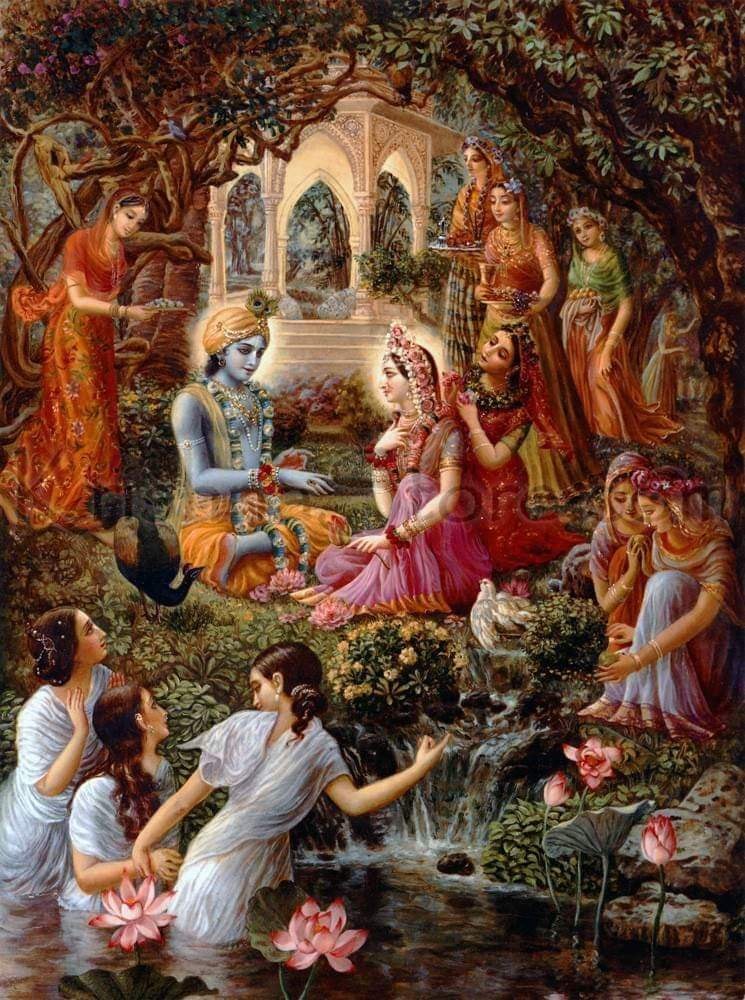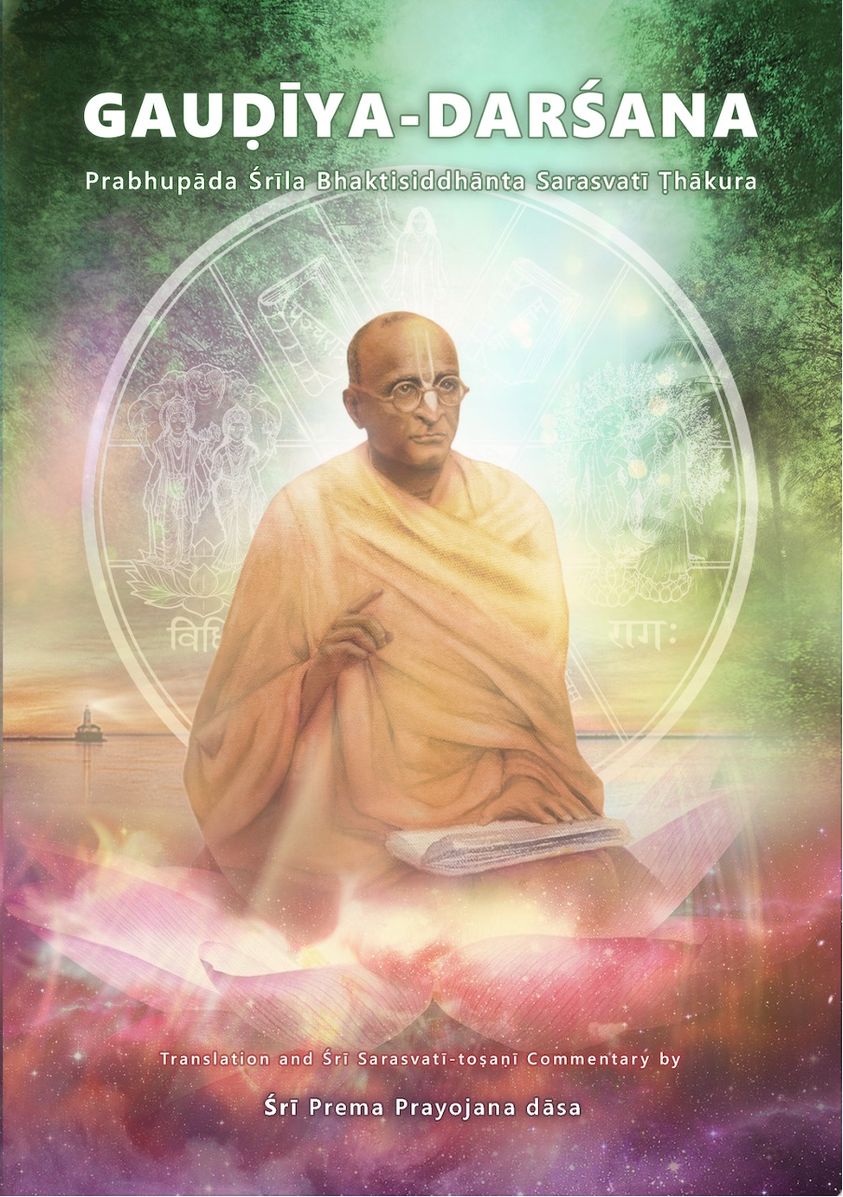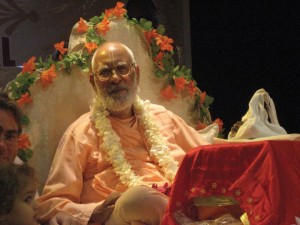
A discourse given on June 15, 2005 in Badger, California, by Srila Bhaktivedanta Narayana Goswami Maharaja, based on Śrīla Bhaktivinoda Ṭhākura’s book, Śrī Śrīmad Bhāgavata Arka Marīcimāla, which means “A Garland of Śrīmad-Bhāgavatam Verses.”
The Truth of the Soul
The subject matter regarding the established philosophical truths of the living entity (jīva-tattva) is very advanced. Still it is essential to know, especially for those who actively share spiritual topics with others. Lucid knowledge of philosophical truths is the foundation of a strong spiritual life.
siddhānta baliyā citte nā kara alasa ihā ha-ite kṛṣṇe lāge sudṛḍha mānasa (Śrī Caitanya-caritāmṛta, Ādi-līlā 2.117)
A sincere student should not neglect the discussion of such conclusions, considering them controversial, for such discussions strengthen the mind. Thus, one’s mind becomes attached to Śrī Kṛṣṇa. Although this subject is elevated and profound, it gradually becomes easier to understand, and over time, to read or discuss it becomes relishable. Do not be disheartened and think, “Oh, it is such a lofty topic. My mind is not able to even touch it.”
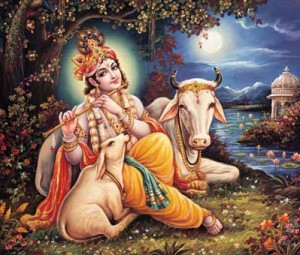
Krishna
We Stood on the Shoreline In all Vaiṣṇava or devotional literature, we find someone who asks questions and someone who answers those questions. This recurring theme points to the foundation of spiritual life: humble inquiry to know the truth. God Himself set this example, as seen in the conversations between the Supreme Lord Śrī Caitanya Mahāprabhu and His associates Śrīla Rāya Rāmānanda and Śrīla Sanātana Gosvāmī. In this mood, the great king Parīkṣit Mahārāja inquires from the sage, Śrīla Śukadeva Gosvāmī: “The living entity’s transcendental constitution is spiritual and conscious, whereas the Lord’s deluding material potency, māyā, is inert and mundane. How is it, then, that the living entity became entangled in māyā? This is very amazing.”
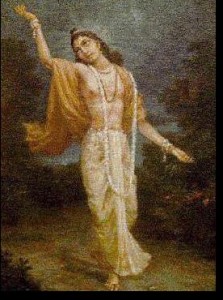
Sri Caintanya Mahaprabhu
Śrīla Śukadeva Gosvāmī replies:
bhayaṁ dvitīyābhiniveśataḥ syād
īśād apetasya viparyayo ‘smṛtiḥ
tan-māyayāto budha ābhajet taṁ
bhaktyaikayeśaṁ guru-devatātmā
(Śrīmad-Bhāgavatam 11.2.37)
Fear arises when a living entity misidentifies himself as the material body because of absorption in the external, illusory energy of the Lord. When he thus turns away from the Supreme Lord, he also forgets his own constitutional position as a servant of the Lord.
This bewildering, fearful condition is the effect of the potency of illusion, called māyā. Therefore, an intelligent person should engage unflinchingly in the unalloyed devotional service of the Lord under the guidance of a bona fide spiritual master, whom he should accept as his worshipful deity and as his very life and soul.
This verse indicates that Śrī Kṛṣṇa is the root of all existence. He is the Absolute Truth, ‘one without a second.’ He is the ultimate person; He is the first, with no second. He is the personification of complete and total existence. He manifests various potencies, unlimited living entities (jīvas), and innumerable worlds; and even His father Nanda Mahārāja, His Mother Yaśodā, and all of His associates are His manifestations. He is thus the worshipful Deity of all.
By the living entity’s constitution, he is an eternal servant of that Supreme worshipful Lord, Śrī Kṛṣṇa. As stated in Śrī Caitanya-caritāmṛta (Madhya-līlā 20.108):
jīvera ‘svarūpa’ haya ñ kṛṣṇera ‘nitya-dāsa’
kṛṣṇera ‘taṭasthā-śakti’ ‘bhedābheda-prakāśa’
It is the living entity’s constitutional position to be an eternal servant of Kṛṣṇa, because he is the marginal energy of Kṛṣṇa and a manifestation simultaneously one with and different from Him. As an eternal servant of Kṛṣṇa, the jīva soul is blissful by nature.
However, in one crucial moment he looked towards the Lord’s external potency, thinking that something exists besides the Lord. Being part and parcel of Kṛṣṇa, the jīva’s intrinsic nature is to look towards Kṛṣṇa; so why did he look towards māyā? The answer is that Kṛṣṇa has given the jīva independence. If the jīva misuses that independence, he is entrusted to the jurisdiction of māyā and punished.
Grabbed by māyā he becomes materially absorbed, and in this predicament no other materially absorbed person can save him. In the above-mentioned verse by Śrīla Śukadeva Gosvāmī (Śrīmad-Bhāgavatam 11.2.37), the words īśād apetasya viparyayo ‘smṛtiḥ confirm that the jīva was standing at the line running between the transcendental world and the inert, material world. By his choice he looked to this ‘lovely’ māyā, who showed him the ways in which he could enjoy on his own, apart from Kṛṣṇa.
Spellbound by māyā, the jīva thought, “It is my right to enjoy.” Māyā immediately supplied him a subtle body (made of material mind, intelligence, and false ego) and gross body (made of bones, blood, skin, urine, stool, and so forth), and he began to think, “I am this body and everything in relation to this body is mine.” Thus, when the jīva turns away from Kṛṣṇa by his free will and independence, he becomes enveloped by the misconception of this bodily concept of life and becomes enamored by the beautiful forms manufactured by māyā.
Having entered this realm of existence, he cannot find the way out by himself. The only escape is the shelter of those who know the way out. After a long time of being bound in this world of birth and death, the fortunate jīvas may be approached by a pure devotee saying, “What are you doing, my brothers, my sisters? You are misguided. You have derailed from the path of love of God. Come with me; I will guide you on the path to true happiness.”
Only by proper association can one develop spiritual consciousness and consider the truth: “I am an eternal servant of Śrī Kṛṣṇa, and I can serve Him with love and affection like those in the spiritual realms of Vraja and Vaikuṇṭha. This world is only a shadow of that sublime spiritual consciousness of love and service.” In the Śrīmad-Bhāgavatam verse above, Śrīla Śukadeva Gosvāmī explains to Parīkṣit Mahārāja the importance of associating with saintly, exalted devotees of the Lord.
A saintly devotee can change the heart of the misery-stricken conditioned soul in one moment.
‘sādhu-saṅga’, ‘sādhu-saṅga’ ñ sarva-śāstre kaya
lava-mātra sādhu-saṅge sarva-siddhi haya
(Śrī Caitanya-caritāmṛta, Madhya-līlā 22.54)
The verdict of all revealed scriptures is that by even a moment’s association with a pure devotee, one can attain all success. Śrīmad-Bhāgavatam declares that anyone who is sincerely chanting and remembering Kṛṣṇa under the guidance of a sādhu is destined to become happy.
If even a neophyte devotee (kaniṣṭha-adhikārī) is chanting and sincerely weeping for Kṛṣṇa, lamenting his fallen state, he is destined to become happy through the shelter of saintly association. One may be entangled in numerous unwanted mentalities and habits, but if one chants sincerely, he becomes happy. That happy devotee will show a person the spiritual path and advise him, “I know a bona fide, self-realized guru, and by his help I have become so joyous. Come with me; I will introduce him to you.”
This person is called vartma-pradarśaka guru, the guru who shows the path. Śrī Kṛṣṇa is very merciful; He is the guru in the heart (caitya-guru). Together with the vartma-pradarśaka guru, He guides a person to the bonafide, self-realized guru. Accepting the bona fide guru, that person begins to perform devotional activities (bhajana) in the service of Śrī Kṛṣṇa, and gradually all his unwanted habits and mentalities disappear.
In the Eleventh Canto of the Śrīmad-Bhāgavatam, Śrī Kṛṣṇa tells Uddhava, His foremost associate:
ekasyaiva mamāṁśasya
jīvasyaiva mahā-mate
bandho ‘syāvidyayānādir
vidyayā ca tathetaraḥ
(Śrīmad-Bhāgavatam 11.11.4)
O most intelligent Uddhava, the living entity, called jīva, is My part and parcel, but due to ignorance he has been suffering in material bondage since time immemorial. By knowledge, however, he can be liberated. In this verse, Śrī Kṛṣṇa praises Uddhava for his intelligence. A sincere devotee of Kṛṣṇa is intelligent because he has chosen the path of bhakti, pure devotion.
There are many so-called intelligent persons in the world, like scientists and politicians, but according to the standard of supreme intelligence ñ the choice to love and serve God ñ such persons’ intelligence is lost. According to this verse, Kṛṣṇa is telling Uddhava, “Uddhava, you should know that on this Earth, and in all material worlds, the spirit soul is My part and parcel. Wandering throughout these worlds since time immemorial, his ignorance has no calculable beginning and therefore the duration of his conditioning cannot be measured.
However, by the influence of the spiritual energy known as yogamāyā, who is the embodiment of timeless transcendental knowledge, the conditioned soul can be liberated.” What is that transcendental knowledge which liberates the soul? It is knowledge of the Supreme Lord’s greatness, and the soul’s eternal relationship with Him. If someone tears a flower, the flower is no longer whole; if he tears it further, it shreds and is destroyed. The entire material world is like this ñ if anything in this world is divided and further divided, the whole is lost.
But this principle does not apply to the spiritual realm. Kṛṣṇa remains complete even though unlimited parts and parcels emanate from Him. This reality is stated in many places in the Vedic scriptures, and one such statement is found in the Bhagavad-gītā:
mamaivāṁśo jīva-loke
jīva-bhūtaḥ sanātanaḥ
manaḥ-ṣaṣṭhānīndriyāṇi
prakṛti-sthāni karṣati
(Bhagavad-gītā 15.7)
The living entities, in this conditioned world are My eternal fragmental parts. Due to conditioned life, they are struggling very hard with the six senses, which include the mind.
It is essential to understand in which way the jīva is part of the Supreme Whole, Śrī Kṛṣṇa, since the Lord can never be divided into parts. There is no limit to His length or width; He has no end ñ no top and no bottom. The entire world is within Him, yet He Himself is not divided. For example, we can cut a pebble from a boulder, but we cannot cut anything from Kṛṣṇa. The jīva is not a part of Kṛṣṇa in the same way that a small piece of stone is part of a larger stone.
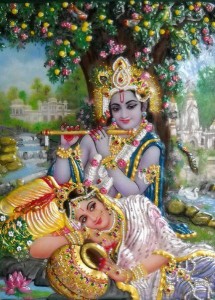
Because Śrī Kṛṣṇa is the Complete Whole, the complete Absolute Truth, the personification of complete existence, even though so many manifestations and expansions emanate from Him, He remains the complete balance. The Supreme Personality of Godhead Kṛṣṇa has two types of expansions. His viṣṇu-tattva expansions, known as svāṁśa, are His plenary (direct and full) incarnations. The living entities, known as vibhinnāṁśa, are not full or direct expansions. They are His infinitesimal, separated parts and parcels.
The following analogy helps us understand the Supreme Lord in relation to His plenary incarnations. The Lord can be compared to a ghee-lamp that lights other ghee-lamps. Some lamps almost equal the light of the original and some lamps have only tiny flames; it depends on the size of the lamp. Moreover, if the flame of one ghee-lamp is used to light another, the first flame will remain the same as it was. It will not become smaller or lose potency. Similarly, although innumerable plenary incarnations have emanated from Kṛṣṇa, the original source of all incarnations, the source has not diminished in power.
oṁ pūrṇam adaḥ pūrṇam idaṁ
pūrṇāt pūrṇam udacyate
pūrṇasya pūrṇam ādāya
pūrṇam evāvaśiṣyate
(Śrī Īśopaniṣad, Invocation)
The Personality of Godhead is perfect and complete, and because He is completely perfect, all emanations from Him, such as this phenomenal world, are perfectly equipped as complete wholes. Whatever is produced of the Complete Whole is also complete in itself. Because He is the Complete Whole, even though so many complete units emanate from Him, He remains the complete balance.
From the point of view of philosophical truth (tattva), Śrī Kṛṣṇa’s plenary incarnations like Rāma and Nṛsiṁhadeva are one with Him. At the same time, from the point of view of the mellow of transcendental relationships (rasa), these incarnations are different. Kṛṣṇa is the origin of all incarnations, such as the līlā-avatāras (pastime incarnations) and the three puruṣa-avatāras, namely Kāraṇodakaśāyī Viṣṇu, Garbhodakaśāyī Viṣṇu, and Kṣīrodakaśāyī Viṣṇu, who control the three various aspects of material existence: creation, maintenance, and destruction, respectively.
The analogy of the ghee-lamp contributes to our understanding of Kṛṣṇa and His plenary expansions (svāṁśa incarnations). Now, to clarify our understanding of the Lord’s expansion as the infinitesimal living entities, we may take the analogy of the cintāmaṇi stone. The word cintā means ‘thought’ or ‘desire,’ and maṇi means ‘jewel.’ The cintāmaṇi stone manifests as much gold as a person desires, but that gold is not directly cintāmaṇi. Similarly, every one of us emanates from Śrī Kṛṣṇa, but we are not Kṛṣṇa Himself.
Cintāmaṇi can manifest unlimited opulence to fulfill anyone’s desires; yet no matter how much gold emanates from it, that jewel remains as it was, without any transformation or diminution. Similarly, Kṛṣṇa always remains full and complete even though unlimited infinitesimal parts and parcels (vibhinnāṁśa jīvas) have emanated from Him. When gold is within the cintāmaṇi stone it is in its original state or position, but when it manifests outside that cintāmaṇi it is transformed.
Similarly, when the living being is within the ‘cintāmaṇi’ of full Kṛṣṇa consciousness, he has spiritual qualities like those of Kṛṣṇa; but when he is outside pure Kṛṣṇa consciousness, in other words when he is entangled in māyā, those qualities appear to be lost or perverted. At that time, when he is absorbed in māyā, only material qualities abound. We Are Infinitesimal, He Is Infinite
ekaḥ śuddhaḥ svayaṁ-jyotir
nirguṇo ‘sau guṇāśrayaḥ
sarva-go ‘nāvṛtaḥ sākṣī
nirātmātmātmanaḥ paraḥ
(Śrīmad-Bhāgavatam 4.20.7)
The Supreme Soul is one. He is pure, non-material, and self-effulgent. He is the reservoir of all good qualities and He is all-pervading. He is without material covering and He is the witness of all activities. He is completely distinguished from other living entities and He is transcendental to all embodied souls.
This verse describes the qualities of the Supreme Personality of Godhead, thus highlighting several distinctions between Him and the individual soul. Some say that all living entities are God, and the proponents of this belief misinterpret such Vedic aphorisms as tat tvam asi [meaning ‘the living entity is a spiritual particle of the supreme spirit’] to mean ‘you are that impersonal God;’ sarvaṁ khalv idaṁ brahma [meaning ‘there is no existence beyond brahma, the Absolute Truth’] to mean ‘everything is God;’ prajñānaṁ brahma [meaning ‘pure knowledge is transcendental and is of the same spiritual substance as brahma’] to mean ‘brahma is impersonal consciousness;’ and ahaṁ brahmāsmi [meaning ‘I am not this body; I am spirit soul’] to mean ‘I am that spirit whole. I am brahma.’
The leader of such proponents, Śaṅkarācārya, is an incarnation of Śankara, Lord Siva. He was very clever; although he appeared to be the leader of the impersonal path, his actual purpose was to fulfill the desire of Lord Kṛṣṇa. Kṛṣṇa had instructed Śankara, “Go to the material world and hide Me from all those who are opposed to My pure devotion, those who serve and worship Me with the desire to become very powerful like the demons Hiraṇyakaśipu and Rāvaṇa. Such false devotees will create great disturbances, so keep them far away from Me.
Go and delude them by misinterpreting the Vedas. Tell them this: ‘Why are you worshiping Kṛṣṇa? You yourself are God in every respect. We are all one with that impersonal God.’” Thus, impersonalism is not an idea of the Vedas themselves. In truth, we are not God, nor is God impersonal. He is a person, and we are His parts and parcels, His eternal servitors. The Supreme Personality of Godhead is one without a second, whereas the jīvas are unlimited in number What does it mean that the jīvas are unlimited in number?
Suppose that all persons in this universe become liberated, and the material universe then becomes vacant of humans. Still, there are so many jīvas in the blood of even one human being that if each of those jīvas were to take a human body, hundreds of thousands of universes would overflow with human population. This localized example gives a hint of the unlimited number of living entities within the universe, and there are also unlimited jīvas in the spiritual worlds of Vaikuṇṭha and Goloka Vṛndāvana.
This multiplicity is one of the prime distinctions between the jīva and God. Consider this distinction as well: the individual soul is not present in an object such as a microphone, but the Paramātmā, Śrī Kṛṣṇa’s form as the Supersoul, is present there. Nothing in this world exists without the presence of Paramātmā. There are two souls present within each body ñ the infinitesimal jīva and the Lord’s manifestation as Paramātmā. The jīva is entangled in fruitive activities (karma), trying to relish the fruits of his labor.
The Supreme Lord is not a conditioned soul, and He is not enamored by the material energy. He is simply the witness within the jīva’s heart. The Supreme Lord is eternally pure, and māyā, or delusion, is far away from Him and His abode. Māyā cannot attract the Lord, but the jīva, being minute, can be attracted by māyā at any time. Śrī Kṛṣṇa is always pure and self-illuminating, whereas the jīva is prone to be influenced by the darkness of illusion and can thus be covered by the mistaken identity of bodily identification.
Kṛṣṇa appears personally in His beautiful form of Vrajendra-nandana, the son of Nanda Mahārāja, to those who perform bhajana, devotional meditation and service to Him. To those who serve the Lord in His opulent, four-handed form as Vaikuṇṭha Nārāyaṇa, He appears as Lord Nārāyaṇa. Here in this world, He resides as the witness in the heart of every individual living being, and He is also situated in each and every atom as Paramātmā. The Lord manifests in an astounding array of forms and energies, while the jīva is very limited; he is localized and minute.
Śrī Kṛṣṇa is the eternal Absolute Truth. Kaṭha Upaniṣad (2.2.13) says,
“nityo nityānāṁ cetanaś cetanānāmñ of living beings He is the Supreme Living Being, and among all eternals He is the Prime Eternal.” Although the jīva is known to be His separated part and parcel, he is not actually separate. The jīva has no separate existence from Kṛṣṇa and he will always be subordinate to Him, in this world and in the spiritual world. Kṛṣṇa is free from material qualities and at the same time possesses all transcendental qualities.
The jīvas can reach the stage of having qualities like the Lord’s when, by the grace of God and guru, they realize their eternal nature of subordination to Him. Our Choice to Dream Once, the great saint Vidura went to Badrikāśrama in the Himalaya Mountains to see Maitreya Ṛṣi, a learned sage and a recipient of Śrī Kṛṣṇa’s mercy. Vidura approached Maitreya Ṛṣi and inquired, “It is very amazing: although the jīva is a conscious being and is always connected with the Supreme Lord Kṛṣṇa’s form as the Supersoul, he becomes entangled in māyā.
How is this possible?” Maitreya Ṛṣi replied, “I will tell you, in brief, the only reason. Kṛṣṇa possesses an inconceivable power known as aghaṭana-ghaṭana-paṭīyasī-śakti, the power which makes the impossible possible. It is this power that hides the Lord’s mercy from the jīva who chooses to turn away from Him, thus compelling that jīva to become a conditioned soul.” Consider that māyā is also one of Kṛṣṇa’s potencies and thus cannot do anything against His will. Ultimately, therefore, Kṛṣṇa is the cause of māyā’s workings.
Why, then, has Kṛṣṇa created such an environment that causes so many jīvas to suffer? The answer is that creating the material world is one of His unlimited pastimes. There is no lack in the variety of His innumerable pastimes, and this is one of them. The Lord is fully independent to do as He chooses. We cannot challenge Him, and as stated in the Vedic scriptures, we cannot understand Him by argument or logic. acintyāḥ khalu ye bhāvā na tāṁs tarkeṇa yojayet (Mahābhārata, Bhīṣma-parva 5.22) We should not try to understand things beyond our material conception by argument and counter-argument.
It is not possible to understand transcendental matters with the limited, mundane mind, and therefore we rely on the descriptions of that realm from the Vedas. We rely on the essence of the Vedas, which is the Śrīmad-Bhāgavatam, and on the great saints known as the Six Gosvāmīs, who have given us the essence of Śrīmad-Bhāgavatam in their own writings. As mentioned above, only by the influence of Śrī Kṛṣṇa’s inconceivable energy that makes the impossible possible does the jīva become bewildered by māyā, under the sway of the conceptions ‘I,’ ‘me,’ and ‘mine,’ which are based on the illusion of bodily identification.
In his natural state, in his constitutional form, the jīva is pure. Although he is minute, he is an atomic portion of cit-śakti, Lord Kṛṣṇa’s own transcendental potency.[iv]4 He is now conditioned by a material body, but there is nothing material ñ no māyā ñ in his natural, spiritual constitution. Material conditioning is called ‘bondage,’ but this bondage is not real. It is not reality because it does not touch the transcendental soul. When a man sleeps at night, he may dream that his head is being cut off, but when he wakes up he sees that nothing has happened.
Similarly, by the mercy of guru and Kṛṣṇa, when we awaken to Kṛṣṇa consciousness we think, “What was I seeing all that time? It was just like a dream.” If suffering comes to you, you need not be upset or nervous. Just remember that this apparent suffering is due to being under illusion, like living in a dream. Maitreya Ṛṣi continued to explain to Vidura that where there is no sun there is darkness; but in truth, darkness does not exist, for it is simply the absence of light. Similarly, where there is no service to Kṛṣṇa, who is like the sun, there is māyā, or darkness.
Maitreya gave the following analogy: On a moonlit night, the moon in the sky and a tree standing on the bank of a pond are both reflected in the water. When the wind blows and there are ripples upon the surface of the water, it seems as though the moon and the tree are swaying back and forth. In truth, however, both are solid and still; they are not trembling at all. Similarly, in this world we accept reflection as reality. We appear to be suffering in various material conditions, but actually we are transcendental to matter.
Although it is not possible to understand with material senses or mind, the jīva is an eternal servant of Kṛṣṇa even if in his conditioned state it appears that he is not. Here is yet another analogy: If one places a cloth over a watch, one cannot see any movement of the hands of the watch ñ but there is movement. Similarly, we see only our bodily and mental activities. We cannot understand that there is an eternal soul inside the body, without whom the body would not be able to function.
We are conscious, infinitesimal parts and parcels of the Lord, somehow serving the Lord even in this stage of bondage although we do not realize it. For example, the demon Kaṁsa was serving Kṛṣṇa in an indirect way. Kaṁsa’s atrocities were an integral cause for Kṛṣṇa’s appearance in this world; if there were no Kaṁsa, there would be no sweet pastimes of Śrī Kṛṣṇa in Vṛndāvana. Similarly, Rāvaṇa’s atrocities were an integral cause for the appearance of Lord Rāma; if there were no Rāvaṇa, the enemy of Lord Rāma, there would be no sweet pastimes of Lord Rāma in this world.
Similarly, the conditioned jīva is serving the Lord, but indirectly. At present he is serving the Lord’s deluding māyā potency. He is now in a dream, dreaming that he is his various material bodies. Our Awakening Hidden in the heart of the material body, every jīva possesses a beautiful, marvellous form. It is with this transcendental form (called siddha-deha) that the jīva can serve Kṛṣṇa directly. Although this spiritual form is now covered, by the mercy of guru and Kṛṣṇa all unwanted habits and mentalities gradually disappear and it is gradually revealed.
When one reaches the stage of bhāva, spiritual emotion (also known as svarūpa-siddhi, devotion that is transcendental to the modes of material nature manifests in the heart and one can awaken to the realization of his or her own divine form. Then, receiving the mercy of Śrī Kṛṣṇa, one becomes totally freed from this gross material body, mind, intelligence, false ego, and contaminated consciousness. Regarding Śrī Kṛṣṇa Himself, He never has a material body. He did not leave a material body behind when He left this planet and disappeared from the world’s vision.
Not only is Kṛṣṇa’s form transcendental to any kind of material body, it is the very cause of all spiritual and material worlds. In order to understand these deep subject matters and realize our original, internal self, let us aspire to attain the mercy of the bona fide spiritual master, and through him, aspire to perform bhajana. evaṁ-vrataḥ sva-priya-nāma-kīrtyā jātānurāgo druta-citta uccaiḥ hasaty atho roditi rauti gāyaty unmāda-van nṛtyati loka-bāhyaḥ (Śrīmad-Bhāgavatam 11.2.4)
By chanting the holy name of the Supreme Lord, one comes to the stage of love of Godhead. Then the devotee is fixed in his vow as an eternal servant of the Lord, and he gradually becomes very much attached to a particular name and form of the Lord. As his heart melts with ecstatic love, he laughs very loudly or cries or shouts. Sometimes he sings and dances like a madman, for he is indifferent to public opinion. Such a pure devotee has no shyness in regards to expressing his devotion.
He chants loudly, unaware of his environment and unaware of whether or not he is dressed. Constantly remembering the pastimes of Kṛṣṇa, sometimes he weeps, “Kṛṣṇa, where are You?” and sometimes he rolls on the ground, laughing. Ordinary people consider him mad, but he is simply experiencing love of God. This spiritual realization is our true position and it is the aim and object of our life. Let us endeavor to engage our mind in hearing (śravaṇaṁ), worshiping (arcanaṁ), and especially in chanting the holy names of the Lord (nāma-saṅkīrtanaṁ).
Question: Is the jīva conscious of what he is doing when he chooses to turn away from Kṛṣṇa and become enamored by māyā? Śrīla Nārāyaṇa Gosvāmī Mahārāja: No, he is unaware of the implications of his choice. He thinks, “I am doing the best thing for myself. I will enjoy.” He is like a baby trying to capture fire with his bare little hands. He believes that the fire is something he can eat, whereas that fire will devour him. Similarly, the jīva looks towards this world for enjoyment, but is devoured by the cycle of repeated births and deaths, sorrows, and suffering.
If you are always engaged in the practices of bhakti, then māyā ñ forgetfulness of your relationship with the Lord ñ will not be able to attract you.
[This discourse, given on June 15, 2005 in Badger, California, is based on Śrīla Bhaktivinoda Ṭhākura’s book, Śrī Śrīmad Bhāgavata Arka Marīcimāla, which means “A Garland of Śrīmad-Bhāgavatam Verses.”

 Posted in
Posted in 






